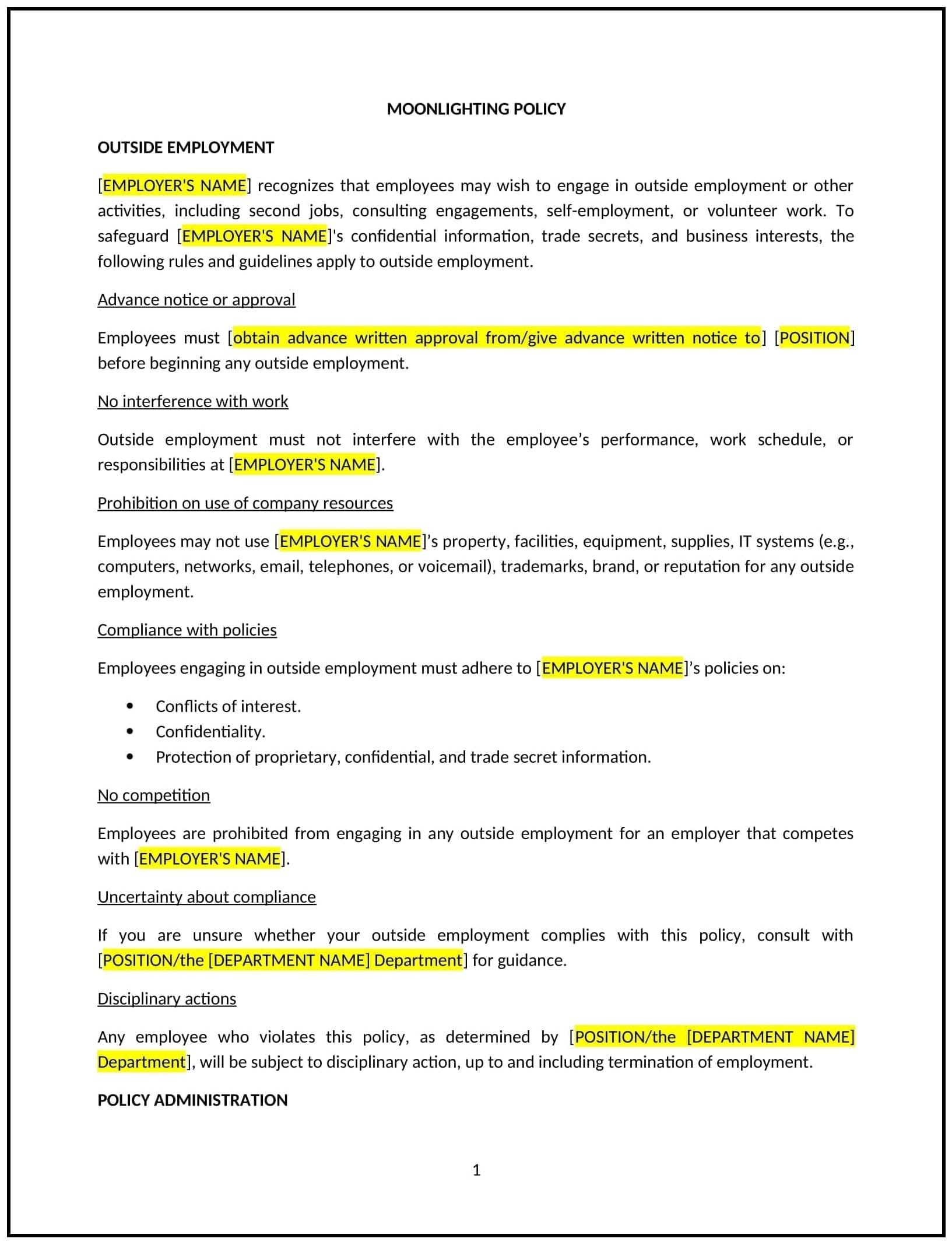Got contracts to review? While you're here for policies, let Cobrief make contract review effortless—start your free review now.

Customize this template for free
Moonlighting policy (New Mexico)
This moonlighting policy is designed to help New Mexico businesses address and manage employee outside employment, often referred to as moonlighting, while ensuring that employees' secondary jobs do not conflict with the company’s interests, productivity, or legal obligations. The policy outlines the company’s expectations for employees who wish to take on additional work outside their primary employment, balancing the employee’s right to pursue other income-generating activities with the business’s operational needs.
By adopting this policy, New Mexico businesses can maintain transparency, prevent conflicts of interest, and ensure that outside employment does not negatively impact employees' performance or the company’s reputation.
How to use this moonlighting policy (New Mexico)
- Define moonlighting: Clearly define what constitutes moonlighting, including any secondary employment or business ventures that employees engage in outside of their primary work with the company.
- Set disclosure requirements: Employees should be required to disclose any secondary employment that may conflict with their primary role. The policy should outline how and when employees should report outside employment to HR or management.
- Establish boundaries and restrictions: Specify any restrictions on moonlighting, such as working for a competitor, engaging in activities that could create a conflict of interest, or taking on work that may interfere with an employee’s duties at the company.
- Clarify performance expectations: Outline how employees must maintain the quality of their work and productivity levels. Emphasize that outside employment should not interfere with their job performance, work hours, or availability for company needs.
- Reflect New Mexico-specific considerations: Address any New Mexico-specific labor laws, such as employee rights related to outside employment or disclosure, that may impact the policy.
Benefits of using this moonlighting policy (New Mexico)
Implementing this policy provides New Mexico businesses with several advantages:
- Prevents conflicts of interest: Clear guidelines help ensure that employees’ secondary jobs do not create conflicts of interest or undermine the company’s business objectives.
- Protects company reputation: The policy helps prevent employees from engaging in activities outside of work that could damage the company’s image, such as working for a competitor or engaging in unethical business practices.
- Enhances transparency: A well-defined moonlighting policy encourages transparency and open communication between employees and management, ensuring that all parties are aware of any outside employment.
- Maintains productivity: By ensuring that moonlighting does not interfere with employees’ primary responsibilities, businesses can maintain high levels of productivity and focus.
- Supports employee autonomy: The policy allows employees the freedom to pursue outside work opportunities, as long as they do not conflict with the company’s interests, contributing to higher employee satisfaction and work-life balance.
Tips for using this moonlighting policy (New Mexico)
- Communicate the policy clearly: Ensure that employees are aware of the moonlighting policy and understand their responsibilities in disclosing outside employment. The policy should be shared in the employee handbook and reviewed during onboarding.
- Monitor employee performance: Regularly monitor employees’ performance to ensure that outside employment is not affecting their work quality or productivity. Address any concerns promptly and fairly.
- Set expectations for secondary employment: Clearly outline the types of outside employment that may be prohibited or restricted, such as working for a competitor or engaging in activities that create a conflict of interest.
- Be fair and consistent: Apply the policy fairly and consistently across all employees, addressing any issues of outside employment on a case-by-case basis to ensure fairness.
- Review and update regularly: Periodically review the policy to ensure it remains relevant to the business and compliant with New Mexico laws. Update the policy as necessary based on changes in the workplace or employment law.